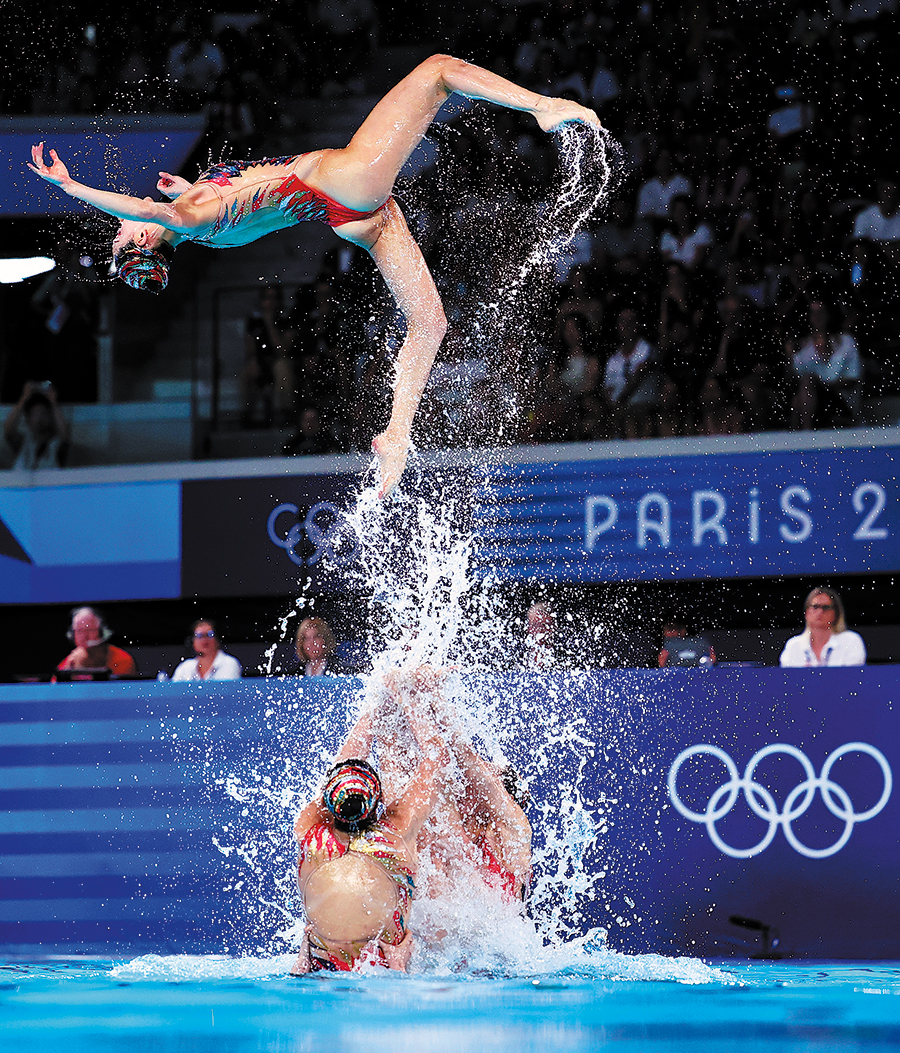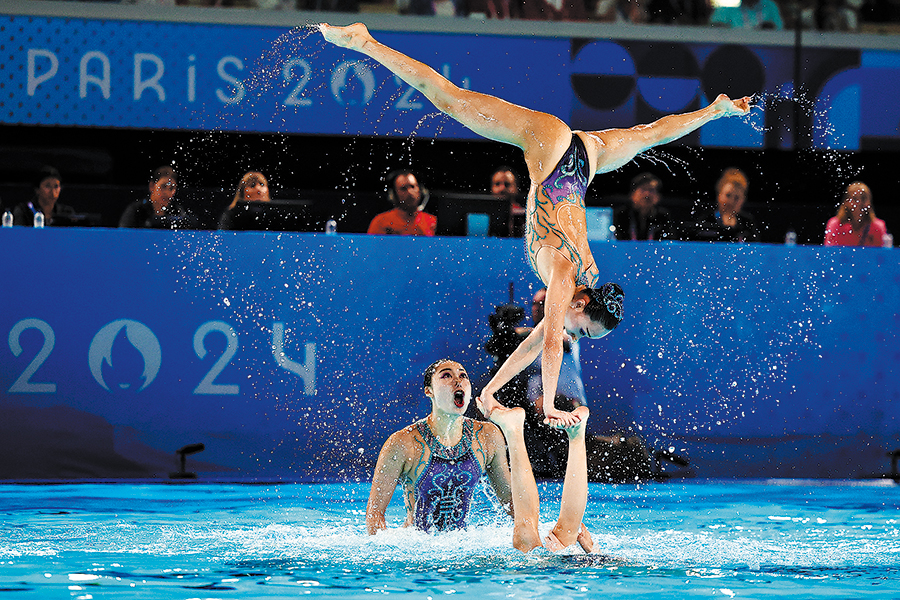In 1983, by the outdoor swimming pool at Beijing's Taoranting Park, the seeds of a dream were planted, when a group of Chinese artistic swimmers gathered for the first time. Nearly 15,000 days and nights of relentless effort from themselves and successive generations later, that dream has finally become a reality — China has been crowned Olympic champion. On Wednesday night, in Saint-Denis in the northern suburbs of Paris, the Chinese artistic swimming team clinched a first-ever Olympic gold medal in the team event. The team, consisting of Feng Yu, Chang Hao, Wang Ciyue, Zhang Yayi, Wang Liuyi, Wang Qianyi, Xiao Yanning, Cheng Wentao and Xiang Binxuan, delivered a stunning performance in the team acrobatic routine, earning 283.6934 points and taking their overall score to an insurmountable and history-making 996.1389. "We have not only fulfilled our own dreams, but also carried the aspirations of generations before us. As a generation entrusted with a significant responsibility, we came to Paris thoroughly prepared, hoping that three years of hard work would yield a perfect result," said team captain Feng. Before departing for Paris, Feng, who served as the female flag bearer for the Chinese delegation at the opening ceremony, vowed to "impress the judges and surprise the audience". At the Olympic Aquatics Centre, that promise was fulfilled. After their victory, the Chinese athletes celebrated by high-fiving every medalist. "Happiness needs to be shared. We wanted to share our joy with all the athletes, not just because it's our first gold medal, but because we are all winners," explained Wang Liuyi. Wang Liuyi's twin sister, Wang Qianyi, was participating in her second Games. Sharing the Olympic stage with her sister made the moment even more special. "Last time, I competed in the Olympics alone. This time, standing on the podium with my sister feels completely different. Even though it's a team event, having my sister by my side makes me even happier, especially because we won the gold medal," said Wang Qianyi. The Paris Olympics saw new rules introduced for the artistic swimming team event, which now includes a technical routine, a free routine and an acrobatic routine, each of which is scored separately. The team with the highest combined score is crowned champion. A major change in the rules is that any mistake, or a failure to complete the declared difficulty, will result in the score being downgraded to the base score. "With the new rules, all countries start on an equal footing. During our preparation, we faced both successes and setbacks. Despite the high expectations for this gold medal, we managed to handle the pressure," said Wang Liuyi. "The biggest challenge is not the external competition or the difficulty levels of other countries, but ourselves." In February, the team delivered its best-ever performance at the World Championships in Doha, securing seven gold medals, one silver and a bronze — a massive confidence boost ahead of Paris. And what boost it was! On Aug 5, China led the field with a score of 313.5538 in the technical routine. The following evening, they maintained their dominance in the team free, with a routine that scored 398.8917, the highest of the competition. Their routine featured a tribute to the Paris Games with a formation resembling the iconic Eiffel Tower. On Aug 7, the team delivered a nearly flawless performance in its final routine, once again earning the highest score and setting a new benchmark in Chinese artistic swimming. Zhang Xiaohuan, the team's head coach, explained that she integrated Chinese cultural elements into the routine choreography to emphasize the artistic sensibilities of the nation's heritage. "For instance, one formation represents the Chinese character shan (mountain) found on ancient oracle bones, evoking the imagery of rising peaks. This also reflects our team's relentless pursuit of its dreams," she explained. "Preparation was tough, but we kept ourselves in the fight and persevered. I think this was a great performance. We also drew inspiration from our competitors, as well." Zhang Xiaohuan noted that the new rules required athletes to master challenging maneuvers that they had never attempted before, so there was not only considerable pressure, but a physical toll. "They fought hard and never gave up. Training has been extremely demanding, with athletes suffering broken bones, facial injuries, and other issues that required hospital visits," Zhang Xiaohuan said. She also acknowledged the crucial technical assistance from China's diving team, which played a key role in the high scores of the artistic swimmers in Paris. "I am very pleased with our performance, and I'm sure the Chinese diving coaches are proud of the results, too." Zhang Xiaohuan was the captain at the 2008 Beijing Olympics, when the team won bronze. "That bronze medal was very meaningful to me. Many teammates retired afterward, but I stayed to pursue my dreams. Today's gold medal is the result of the joint effort of several generations of artistic swimmers. It is through that continuous effort that we achieved this success," she concluded. Decades of progress When artistic swimming was added as an official Olympic sport in 1984, China had only just begun to develop the discipline. At the 1988 Seoul Olympics, China's solo swimmers were ranked outside the top 10, while the duet placed 9th. Over the decades since, the Chinese artistic swimming team made gradual progress, with each advancement representing a major milestone. At the 2004 Athens Olympics, the team achieved sixth place in the team event, a significant improvement from its seventh-place finish at the 1996 Games in Atlanta. It took eight years to achieve that single step up the ladder. In 2006, the team enlisted world-class Japanese coach Masayo Imura, known as the "mother of synchro", who helped it overcome technical barriers and achieve significant progress. By the time the 2008 Beijing Olympics arrived, the team was ready to make a historic breakthrough, securing a first Olympic medal. The team then dedicated 16 years to advancing up the steps of the Olympic podium. At the 2020 Tokyo Olympics, it earned silver medals in both the team and duet events, significantly closing the gap with the champion Russian team. Now, in Paris, it has finally reached the highest position on the podium, not with a step, but with a leap, so great was the deficit in points with its nearest rival. Yet the journey isn't over. The duet competition begins Friday, potentially featuring an unprecedented showdown between four sets of twin sisters from China, Austria, the Netherlands and Ukraine. A compelling matchup, indeed, especially as the Chinese pair, Wang Liuyi and Wang Qianyi, have developed a taste for gold and are craving more.



The golden generation
Editor:张立
Source:China Daily
Updated:2024-08-09 17:44:55
Source:China Daily
Updated:2024-08-09 17:44:55
Special
Contact
Welcome to English Channel! Any suggestion, welcome.Tel:0731-82965627
lisl@rednet.cn
zhouqian@rednet.cn











